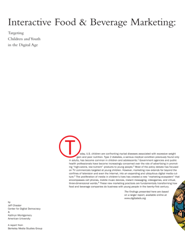(Full Report - PDF (link is external) )(Brief Report - PDF (link is external) ) Written by Jeff Chester, Center for Digital Democracy, and Kathryn Montgomery, American University A report from Berkeley Media Studies GroupToday, U.S. children are confronting myriad diseases associated with excessive weight gain and poor nutrition. Type 2 diabetes, a serious medical condition previously found only in adults, has become common in children and adolescents. Government agencies and public health professionals have become increasingly concerned over the role of advertising in promoting "high-calorie, low-nutrient" products to young people. Most of the policy debate has focused on TV commercials targeted at young children. However, marketing now extends far beyond the confines of television and even the Internet, into an expanding and ubiquitous digital media culture. The proliferation of media in children's lives has created a new "marketing ecosystem" that encompasses cell phones, mobile music devices, instant messaging, videogames, and virtual, three-dimensional worlds. These new marketing practices are fundamentally transforming how food and beverage companies do business with young people in the twenty-first century.

